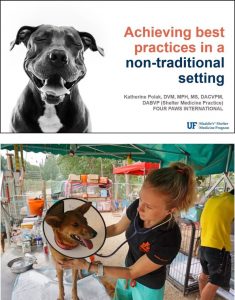Module 4: The Case of the Spay-Neuter Skeptic
HQHVSN in Remote Locations – Getting It Right
Case Study 3: HQHVSN in a Remote Temple
Ethical programs investigate the local community’s needs and integrate in a way that assures cultural humility, continuity of care, sustainability, progressive development of local infrastructure, and measurable lasting impact. There are many excellent volunteer opportunities around the world. Some examples include Greater Good, Animal Balance, World Vets, and RAVS.
Getting it Right
This image is from a volunteer spay-neuter program in Cambodia. The team is working in a temporary open-air clinic set up in a temple in a very hot climate. What do you see that complies with ASV spay-neuter guidelines? Click on the hotspots for more information.
Watch This

Listen to this presentation Achieving Best Practices in a Non-Traditional Setting by Dr. Katherine Polak, as she explains how to adapt essential standards of care to non-traditional international spay-neuter settings. (27 min)
Dr. Polak completed a residency in Shelter Medicine at the University of Florida Maddie’s Shelter Medicine Program and an internship in Shelter Medicine at Colorado State University. She was one of the first veterinarians to become boarded in the new specialty of Shelter Medicine. Dr. Polak currently works for Humane World for Animals, a global charity working to improve the conditions of free-roaming dogs and cats through sterilization programs and to combat the cruel dog and cat meat trade in Southeast Asia. Before joining Humane World, she worked for Four Paws International and for Soi Dog Foundation in Thailand, where she launched a large-scale sterilization campaign aiming to sterilize 80% of Bangkok’s estimated 640,000 free-roaming dogs and managed a large animal shelter in Phuket. Dr. Polak is also the editor of Field Manual for Small Animal Medicine, a practical resource for delivering veterinary care outside the traditional hospital or clinic setting in resource-limited environments.

